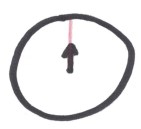I’ve grown enchanted with etymology of late. My recent Google searches include “dive bar” etymology,” “high life” etymology, and etymology etymology.
It’s an addiction.
In mathematical circles, I’m hardly alone. The quirky and irrepressible John Conway feels the same:
“Floccinaucinihilipilification” is his favourite word. He reckons it’s the longest word in the Oxford English Dictionary (it is certainly in the top three), and without prompting he gives an account of its etymology: it is a Latin-based word, invented circa 1730 at Eton as a schoolboy’s joke. And, Conway recites nearly verbatim the OED’s definition: “the action or habit of estimating as worthless.”
Does musing over words’ origins feel worthless? Don’t floccinaucinihilipificate, folks! There’s meaning to be mined here.
Take the first key term of calculus: limit. It’s an ultimate destination, approached to hair’s-breadth precision, by an infinite process.


Its everyday meanings resonate nicely with its mathematical one. Think of the city limits, at the edge of a municipality’s reach; or a speed limit, which you can approach but never exceed (at least, not in theory); or a body’s physical limits, which you can push yourself to attain, but can never outdo.
Each limit can be conceived as a motion towards the unattainable.
Or consider the second word: derive. It comes from the same root as “river,” and means “to draw from a source.”
In math, this refers to the process of extracting a function’s derivative (i.e., its moment-by-moment rate of change) from the function itself. But there’s also a beautiful echo of the derivative’s deeper function: drawing a moment from the stream of time, like a droplet from a babbling brook.

What about integrate? It’s about unifying disparate parts into a whole. You might (like a civil rights leader) integrate diverse peoples into a single citizenry; or you might (like an artist) integrate the features of a landscape into a single image; or you might (like a mathematician) integrate an infinite swarm of infinitesimal pieces into a single shape.
“Integrate” and “integral” share a root, pleasingly, with “integrity” (wholeness of self), “integer” (whole number), and “integral” (essential to the whole).

The fourth word is the most obvious yet elusive: calculate. It means to determine by reason, or to reckon mathematically.
It comes from the Latin word for the small pebble found on an abacus: a little token of number, slid this way and that, according to certain rules. The process requires no insight, no bursts of ingenuity, just the careful execution of preordained steps.
What did the Romans call this hard little symbol for the mechanization of thought? They called it, naturally enough, “calculus.”

Thanks for reading! My new book is Change is the Only Constant: The Wisdom of Calculus in a Madcap World.
Great post!! Who said math is only about numbers!
Get Outlook for iOS
________________________________
If a speed limit were a limit in the Calculus sense, you’d be free to exceed it all you want—just as long as you EVENTUALLY stay within epsilon of the limit.
Good point – though to be fair, this is more or less how I interpret speed limits.
Wait! “Derive” does not mean “take the derivative of”! Deriving A from B means taking a series of legal steps to get from B to A.
Yeah, I’m admittedly being sneaky – technically, the noun is “derivative” and the verb is “differentiate,” for exactly the reason you name (that “derive” already has a mathematical meaning). But I often hear “derive” used this way in casual conversation; I think of it as a mathematical colloquialism.
I like to ruminate a bit about the facts that the name for a triangle with three equal sides comes from Latin, the name for a triangle with two equal legs comes from Greek, and to measure their lengths the we use Arabic numerals (our 1,2,3,4, 5, etc.), which actually originated in India. Which, I suppose, the calculation that can be derived from this examination is that mathematicians have integrated themselves into a world without limits.
So much for “disestablishmentarianism” as the longest English word.
Just out of curiosity – what is the etymology of dive bar?
>
“Young Sheldon” just had this on an episode.
It’s apparently from the fact that they were often located in basements.
I was curious because I feel like I learned the phrase “dive bar” 15 years ago as a derogatory term with connotations of “seedy” and “disreputable,” whereas these days it’s often used fondly, with connotations of “unpretentious” and “casual.”
(Obviously millennials are somehow to blame for this linguistic shift.)
Add “rational” to this list. I think the mathematical definition came first. With the definition migrating from capable of being represented as a ratio to able to be understood, to making sense, to sane.
And “radical” meaning by the roots.
Abacus prized possession during math class